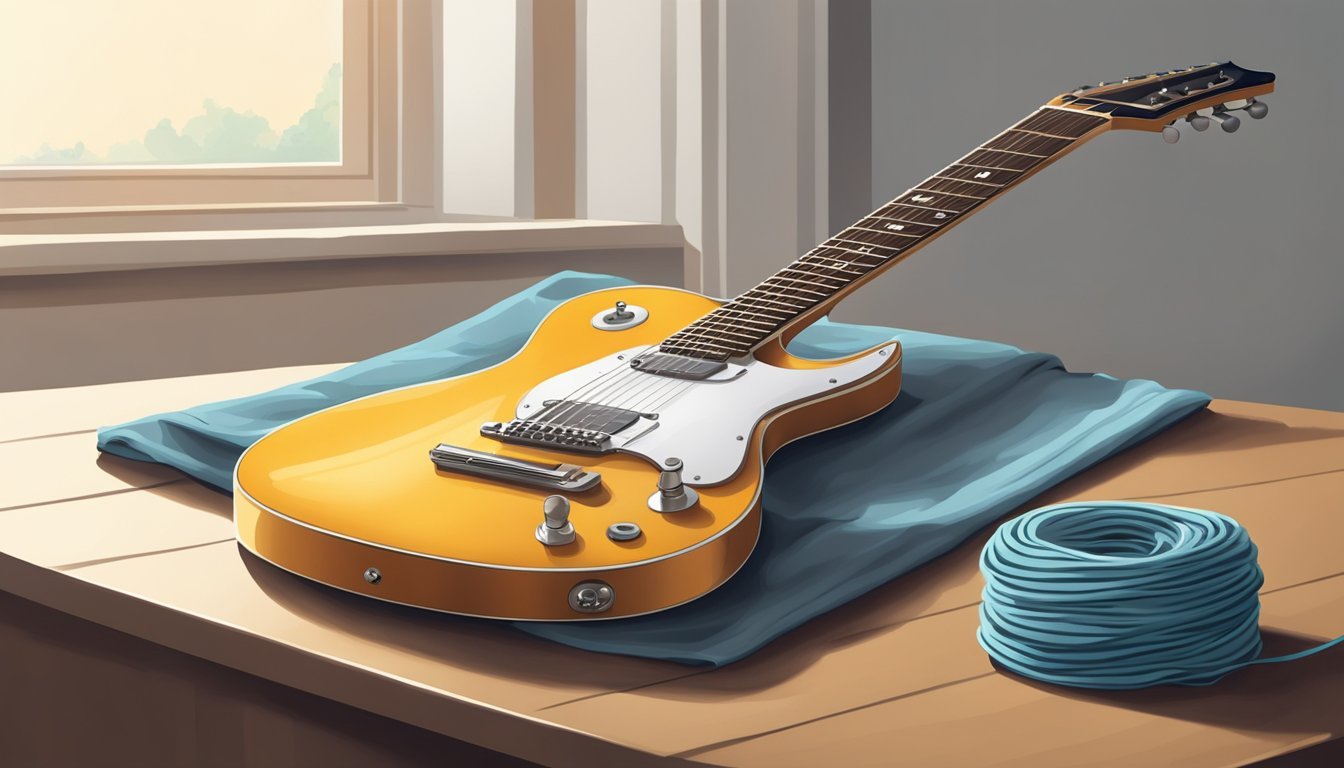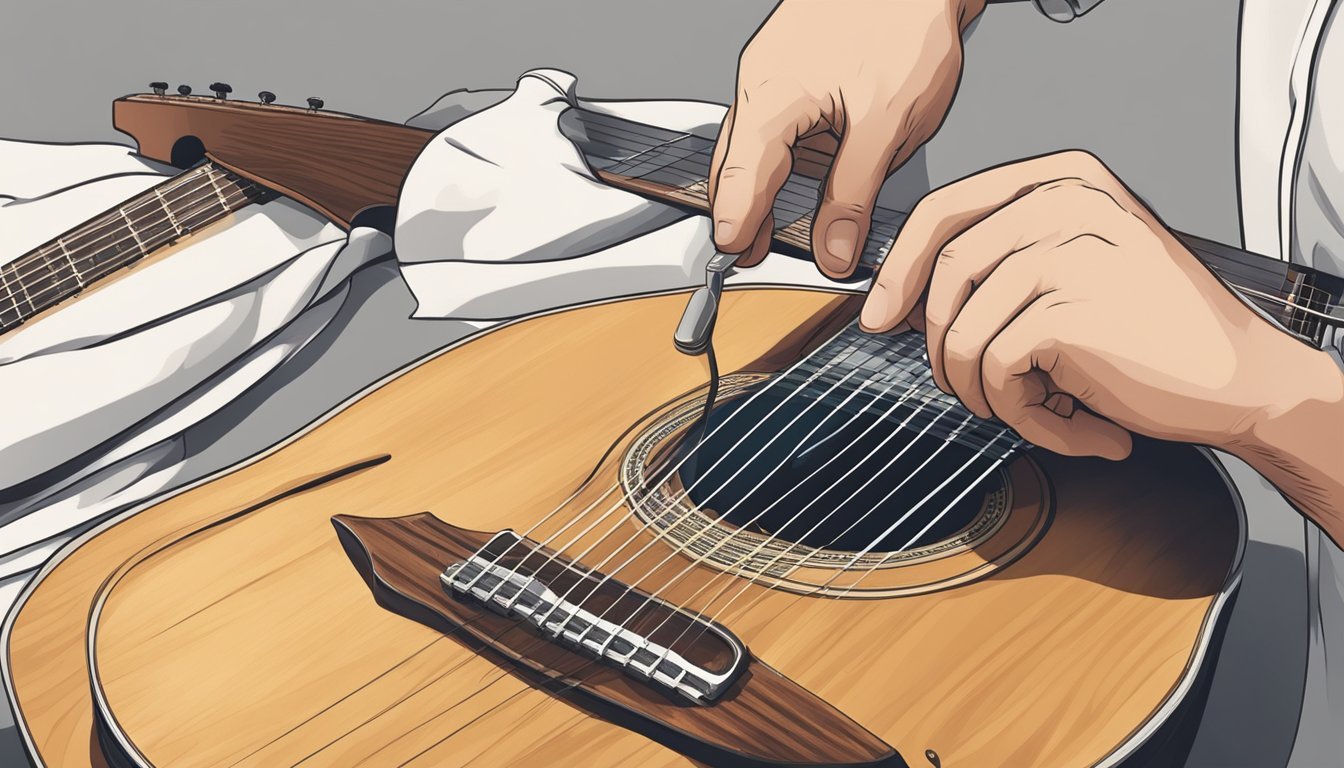Keeping your guitar strings clean is essential for good sound and long-lasting play.
Regularly cleaning your guitar strings will help maintain their tone and extend their life.
Oils and grime can build up over time, affecting both the sound and feel of your instrument.
Learning how to properly clean your strings can seem tricky, but with a few simple steps, you can keep them in top shape.

Taking care of your strings is not just about cleaning; it’s also about knowing when to replace them.
Understanding the signs of wear will help you know when it’s time for new strings, ensuring you always get the best sound.
In this article, you’ll discover easy methods to clean your strings and the best practices to maintain them after cleaning.
By the end, you’ll be equipped with practical tips to keep your guitar sounding fresh.
Whether you’re a beginner or a seasoned player, these maintenance habits can make a big difference in your music.
Key Takeaways
- Clean guitar strings improve tone and playability.
- Knowing when to replace strings is part of maintenance.
- Regular care extends the life of your guitar strings.
Understanding Guitar String Maintenance
Keeping your guitar strings clean is important for both sound quality and the longevity of your instrument.
Dirt, grime, and oil from your fingers can affect tone and playability.
Regular cleaning helps maintain a better playing experience and keeps your strings in tune longer.
The Effects of Dirt and Oils on Tone
When you play, your fingers naturally transfer oils and dirt onto the strings.
This buildup can lead to a dull tone and a less vibrant sound.
Dust and grime can create a barrier, making it harder for the strings to vibrate freely.
Over time, this accumulation can even cause corrosion.
Corrosion weakens the strings and affects intonation, meaning your guitar might not stay in tune.
Cleaning your strings regularly can help prevent these issues.
To keep the strings sounding their best, make sure to wipe them down after each session.
Use a clean, dry microfiber cloth to remove any oil or dirt right after you finish playing.
Why Regular Cleaning is Crucial
Cleaning your guitar strings is not just a one-time task; it’s part of good guitar maintenance.
Regular cleaning helps extend the life of your strings, saving you money on replacements.
It also improves the feeling of your instrument, making it more enjoyable to play.
By keeping your strings clean, you reduce the risk of buildup on your fretboard.
This helps maintain proper playability, making your tuning more stable.
The less grime on your strings, the more your guitar shines, both in sound and appearance.
Incorporating a quick cleaning routine into your practice will enhance your playing experience.
Even a few moments after each use can make a significant difference over time.
The Cleaning Process
Cleaning your guitar strings is a simple task that can greatly improve your instrument’s sound and lifespan.
With the right supplies and steps, you can keep your strings in top shape.
Gathering Your Cleaning Supplies
Before you start, gather everything you’ll need.
Here’s a quick list of supplies:
- Microfiber cloth: Soft and non-abrasive, great for cleaning without scratching.
- String cleaner or cleaning solution: Use a product made for guitar strings or a bit of rubbing alcohol.
- Clean rag: For wiping down the guitar body and other surfaces.
- Household items: In a pinch, you can also use water.
Having these items ready will make the cleaning process easier.
Make sure you have a clean workspace so you can work efficiently without distractions.
Step-by-Step Cleaning Guide
Now let’s dive into the actual cleaning.
Follow these easy steps to get your strings looking and sounding great.
- Dampen the microfiber cloth: Lightly spray a bit of string cleaner or a cleaning solution on a clean area of the cloth.
- Wipe each string: Firmly hold the cloth around each string. Slide it up and down the length of the string several times. This helps remove dirt and oils.
- Clean the fret area: Make sure to clean around the frets too, as grime builds up here. Use the clean rag to wipe down the fretboard and body of your guitar.
- Inspect your work: After cleaning, check the strings and the guitar. If the cloth is still dirty, repeat until it looks clean.
Taking these steps will help keep your guitar’s strings fresh and ready to play.
Post-Cleaning Care and Maintenance
After you clean your guitar strings, it’s important to take extra steps to keep them in good shape.
Proper care can help improve playability and extend their life.
Here are some key points to consider: lubricating the strings and maintaining their longevity.
Lubricating the Strings
Using a good lubricant can make a big difference in how your strings feel and sound.
You can opt for a dedicated string lubricant or even lemon oil for a natural option.
- Apply the Lubricant: Put a small amount on a clean cloth. Gently rub it along the length of each string.
- Focus on the Areas: Pay extra attention to spots where debris and moisture can build up, especially around the bridge.
This will help keep the strings comfortable to play and reduce friction during use.
Lubricating regularly can also protect against rust and ensure your strings last longer.
Maintaining String Longevity
To keep your strings in top condition, regular maintenance is key.
Here are some tips to keep in mind:
- Clean After Playing: Make it a habit to wipe down your strings after each session. This removes sweat and oils.
- Store Correctly: Make sure to keep your guitar in a stable environment. Avoid places with high moisture.
- Change Strings Often: Pay attention to how they sound. If they feel dull or less responsive, it might be time for a change.
By following these steps, you’ll keep your guitar strings cleaner and more enjoyable to play.
Regular attention goes a long way.
Replacing Your Guitar Strings

Knowing when to replace your guitar strings and which type to choose is important for getting the best sound.
Fresh strings can make a big difference in your playing experience and sound quality.
Here’s how to decide when to make the switch and what strings are best for your guitar.
When to Replace Guitar Strings
One key sign that it’s time to replace your strings is that they sound dull or dead.
New strings have a bright and clear tone, while old strings lose their luster.
If you notice rust or discoloration, that’s another hint.
Playing habits matter too.
If you play every day, you might need to replace your strings every week or two.
For casual players, changing them every month is often enough.
Also, consider your string material.
Steel strings may wear out faster than nylon ones.
If you use a lot of bending or heavy strumming, expect to change them more frequently.
Remember to clean and lubricate your guitar strings to help them last longer.
Choosing the Right Strings for Your Guitar
When selecting new strings, think about your guitar type.
If you have a classical guitar, you’ll need nylon strings.
For acoustic and electric guitars, opt for steel strings.
Each type has its own sound and feel.
Next, consider the gauge, which refers to string thickness.
Lighter gauge strings are easier to play and bend but may not hold up as well.
Heavier gauge strings offer more durability and a fuller sound but can be harder to play.
Always check the manufacturer’s recommendations for string type on your guitar’s fretboard.
This can help you select the best strings for your specific model and ensure optimal performance.
Frequently Asked Questions
Keeping your guitar strings clean is important for sound quality and longevity.
Here are some common questions and answers about cleaning your strings.
What’s the best thing to use when cleaning guitar strings?
A clean, dry microfiber cloth is your best bet for wiping down strings.
If you need extra cleaning power, a specialized guitar string cleaner can help remove grime and oils without damaging the strings.
Can I just use stuff I’ve got around the house to clean my guitar strings?
Yes, you can use common household items like rubbing alcohol or hand sanitizer.
Just apply a small amount to a cloth and gently wipe the strings.
Make sure not to use anything that could leave residue.
Is it cool to use WD-40 to clean my guitar strings?
No, you should avoid using WD-40.
It’s a lubricant, not a cleaner, and it can leave a harmful residue that affects sound quality.
Stick to safe cleaners designed for guitars.
I’ve got an acoustic, how should I be cleaning its strings?
For an acoustic guitar, use a clean microfiber cloth to wipe down the strings after each playing session.
You can also use a guitar string cleaner to remove built-up dirt and oils.
Can you clean guitar strings with vinegar, or is that a no-go?
It’s best to avoid vinegar.
While it can cut through oils, it may also corrode or damage the strings.
Stick to safer cleaning methods for better results.
Do alcohol wipes work for cleaning guitar strings without damaging them?
Alcohol wipes can work well for cleaning guitar strings.
Just make sure they are not overly saturated.
Use them to gently wipe the strings without applying too much pressure.
This way, you keep your strings clean without any damage.

